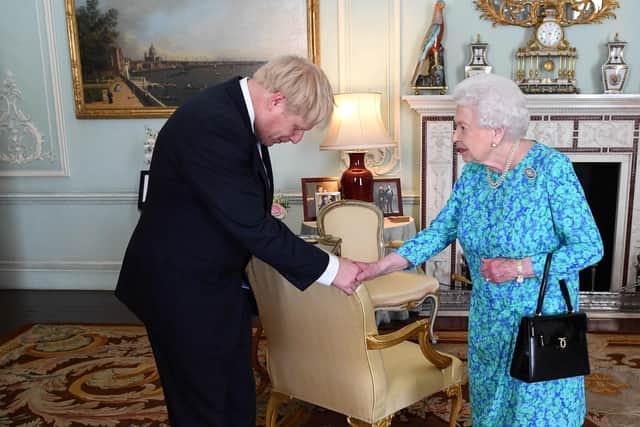Dramatic first year in power for Boris Johnson, but biggest challenge to come
A Brexit standoff, an election landslide, a pandemic, a brush with death, a baby? It is enough drama to fill the story a lifetime, and yet it is just the start of a premiership that ought to last at least another four years.
There was no social distancing among journalists or Number 10 staff as Mr Johnson gave his first speech as Prime Minister in Downing Street. It was a different world politically, too: the Conservative Party was languishing in the polls and had not long suffered one of its worst ever performances at the ballot box, securing just 9 per cent of the vote in elections to the European Parliament.
Advertisement
Hide AdAdvertisement
Hide AdParliament was deadlocked on a Brexit deal, held hostage by blocs of Eurosceptics and Johnson-sceptics on the Tory benches. Yet despite the political challenge appearing insurmountable - it certainly was for Theresa May - the Prime Minister drove through it like a JCB through a wall of polystyrene blocks.


It wasn’t easy, though. The Prime Minister had to throw 21 Tory MPs out to stamp his authority on the parliamentary party, and still the Halloween deadline Mr Johnson set in that Downing Street speech, “no ifs or buts”, came and went.
After weeks of appeals, he was finally given the election he craved by the opposition, and ruthlessly exploited Labour’s weaknesses. “Get Brexit done” was the political project that put Mr Johnson in Number 10, and it was the slogan that won him the biggest Tory majority in three decades.
On the day Brexit was finally done, the UK confirmed its first case of coronavirus. No challenge now facing the Prime Minister is as great as the one that nearly cost him his life. And while for him, the personal stakes were highest in those three anxious days in April when he was in intensive care, the country is still to face the greatest gamble.
The next phase of the coronavirus crisis will be the most significant, as the UK Government and the devolved administrations try to balance the needs of a badly damaged economy against the risks of a pandemic that is out of control across the world, and threatening to burst out of containment around Europe.
Mr Johnson has held out the prospect of life getting back to normal in time for Christmas - but that is when experts believe the UK will be in greatest danger, with the potential for Covid-19 to spread as we spend more time indoors, and the NHS under double pressure from the pandemic and winter flu season. Like his Brexit promise, those words may come back to haunt him.
Even if the virus does remain under control, the unprecedented economic damage may take years to repair. And despite credit for Chancellor Rishi Sunak’s initial intervention to save jobs and prevent widespread destitution during lockdown, even the most modest estimates predict unemployment will double to 1980s-style highs when the furlough scheme comes to an end in October.
Given how the current health crisis has focused attention on care of the elderly, Mr Johnson’s political fortunes will depend on how the government addresses the long-standing problems with social care in England.
Advertisement
Hide AdAdvertisement
Hide AdIn his first Downing Street speech, the Prime Minister made another bold promise. “I am announcing now - on the steps of Downing Street - that we will fix the crisis in social care once and for all with a clear plan we have prepared.” A year on, there is little sign of that pre-prepared plan.
The Prime Minister may have “got Brexit done”, but the current negotiations on the future relationship with Brussels are proving just as difficult as the process of leaving. The current arrangements end on December 31, with businesses potentially also facing a double hit from a second wave of coronavirus and a sudden change to trading arrangements with the EU.
Four months later, Scotland goes to the polls, with the SNP riding high and support for Scottish independence at record levels. The drama isn’t over yet.
Comments
Want to join the conversation? Please or to comment on this article.